

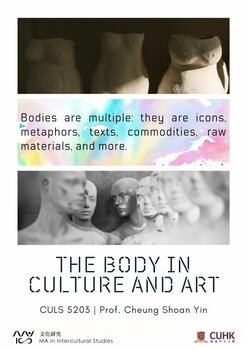 |
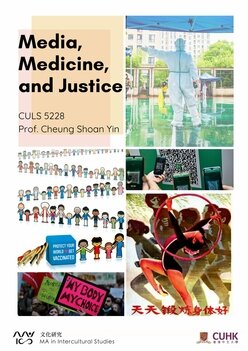 |
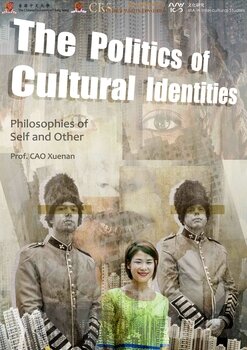 |
 |
 |
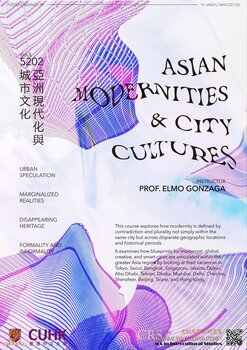 |
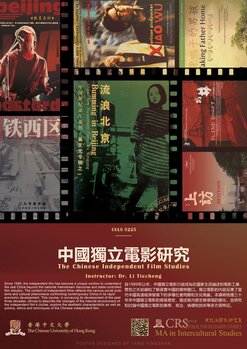 |
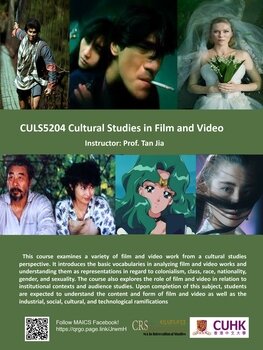 |
The MA in Intercultural Studies Programme at The Chinese University of Hong Kong is at the cutting-edge of the study of film and digital media, gender and sexuality, urbanism, techno-science, posthumanism, and ecological and animal rights.
Our students learn how to apply diverse perspectives and interdisciplinary methods from Literary and Cultural Studies, Critical Theory, Gender and Queer Studies, Cultural Anthropology, Science and Technology Studies, and Urban and Environmental Humanities to examine the complex, dynamic, and contingent interactions between social structures and processes and cultural representations and identities.
Our students become equipped with the critical awareness, cultural sensitivity, and analytical knowhow needed to deal with the difficulties and challenges of a globalized world of intensifying disparities and conflicts.
「文化研究六人問」- Exploring Cultural Studies in Six Voices
【到底文化研究係咩嘢嚟?】-文化研究快問快答
【到底文化研究係咩嘢嚟?】-中大文化研究關鍵詞
Game Studies
Research keywords for Cultural Studies: Waste Studies
Research keywords for Cultural Studies:
Southeast Asian Media and Culture
Research keywords for Cultural Studies:
Independent film
Bao Xiaoyu
I cannot express how much ICS has changed me; it has greatly altered the way I perceive the world. Here are some insights I gained from ICS: "Who am I?" may be the question humans need to explore throughout their lives. If a future Cyberpunk scenario becomes a reality, where, as depicted in Ghost in the Shell, human souls are merely injected into steel bodies, can we truly be certain that I am still me? When the body becomes a social metaphor, we can conduct field investigations and observe the world around us in any situation, using the body as a starting point to explore the underlying social structures. When we stop using the West as a method through knowledge production and begin to inter-reference within the Asian circle, we start using Asia as our method. The question we still need to contemplate is: In a modern society based on progress, scalability, and utilitarianism, where does our value as individuals truly lie? In my year at ICS, I spent the longest time in the university library during this year, and it became a place where I not only acquired knowledge but also cultivated my critical thinking abilities and independent spirit. Lastly, I would like to conclude with a quote from Janet: "We must believe that here, there are sincere people who truly care about this world." ICS is my spiritual utopia, and just the thought of it brings me back home. I hope that the teachers and classmates of ICS will shine brightly on their own paths and realize their self-worth in the future.
顯示更多Gao Weiwei
'There is no stupid question' - a phrase I use to explain my experience in MAICS. It tells me not to be afraid of asking questions and encourages me to be a thinker. My opportunity to reflect on my own life is made possible by the constant encouragement from all MAICS teachers to pay attention to our life experiences. They also inspire me to care about the marginalized groups and things that we overlook. In conclusion, the most crucial lessons MAICS taught me were to think more critically and to be modest.
顯示更多Li Wenbo
What first attracted me to apply to MAICS was the diverse, enriching, and interesting courses. During this short academic year, I have learned and benefited from many courses I had never been exposed to. For example, the two courses on gender studies taught by the gentle and considerate Prof. Janet were indeed what I was very interested in before the formal classes. During my time with Janet, I learned a lot of basic knowledge and broadened my horizons. I also learned to face injustice in the world with a positive, optimistic, and determined attitude, and to pass on tolerance, gentleness, and love to people around me. Thanks to these rigorous, charming, and knowledgeable professors, I have gained a lot from this rare time abroad. What I learned in MAICS also becomes an important cornerstone for my future development.
顯示更多Qi Yifan
The one-year journey in ICS is short but rewarding. Cultural and Politics in the Anthropocene is my motivation to apply for ICS. Whenever I read articles about disasters, wars, and uncertainties nowadays, I always wonder whether there is a way to unite different ethnic groups to tackle the tough issues in the new era regardless of previous hates and conflicts, to call on people from all nations to care about each ethnic group and species instead of from superiority and to build a peaceful multi-species community. The care for marginalized groups is not limited to environmental issues. Gender minorities, digital refugees, and animals are also the subjects that we highlight. Thus, I am very grateful that ICS can give me this great opportunity to disentangle power relations and speak up for marginalized groups. Focusing on so many interdisciplinary fields, ICS provides new possibilities and will work as my guideline to promote dialogue, reconciliation, and peace in my future career.
顯示更多CHEN Cheng Jetson
It was not a peaceful year, the shadow of Covid-19 still looms over us all, and the war in Ukraine marked the faltering of peace, but in the midst of the chaos, I was glad that I still had a desk where I could study and write peacefully. Also, I was always inspired by the passion of my teachers and classmates, and it was a journey that I won't regret. In the future, I hope that my peers and I will remember MAICS; and are always able to hear the cries and whistles from the corners of society and live with warmth as well as enthusiasm for life.
顯示更多JIANG Baier Charlie
There is a rumor about MAICS that once you have taken this programme, you will soon find everything around you problematic. My experience has confirmed that this is not a rumor but the truth. The more I learned from different courses, the more sensitive and critical I have become when trying to comprehend and analyze various issues, and that’s why you will find everything problematic—you know how to perceive a situation with multiple perspectives rather than the binary one; you tend to observe an event by deconstructing and contextualizing it instead of taking it for granted; and you challenge and question all the social and cultural norms you once conformed to, unconsciously. These changes I have experienced might not sound cheerful as the cruel reality is that in this problematic world you reveal, not all the problems are solvable. However, I still cherish this acquired capacity to be sensitive and critical about all the so-called “normal” things in my daily life, as I gradually realize that questioning will always be the first step to making changes.
顯示更多CHAN Hoi Ting Hedy
I was fortunate to have face-to-face classes in the first semester this year. I was glad to meet my teachers and classmates and I could feel their passion and enthusiasm. In MAICS, I learnt the dynamics and relations between social structures and cultural representations. The program offered me theoretical knowledge to understand our culture and society in a different perspective. For example, User-Generated Content and Digital Culture taught me how the internet and algorithms shape our minds in this digital age, and how to analyze media culture through the use of big data. The workshops and activities were also helpful resources for my different research projects. Therefore, I am very grateful to my teachers and classmates and would like to thank you for all the support. It was an unforgettable and fruitful year.
顯示更多HUA Xu
This is not the first time I came across cultural studies. In the undergraduate cultural studies elective courses, I came to know about cultural studies scholars’ detailed understanding of everyday experience, focus on marginal groups, and spirit in searching for ways of resistance. However, it is MAICS that makes me truly aware of how cultural studies theory can echo my own life experience, so I am really grateful to our wonderful teachers who show me their passions for research, the enormously free space for academic exploration in all the courses, and my terrific classmates from diverse backgrounds.
顯示更多LIU Ting
My previous major was engineering, and I worked for seven years as a researcher on algorithms. For me, anything beyond facts and logic was too hard to understand. Fortunately, the MAICS program opened a window for me, which allows me to have a glimpse of the colorful real world. I tried to jump out of the frame of science and technology and started to think about the relationship between technoscience and society. For example, regarding artificial intelligence algorithms, what interested me in the past was their principles, the methods of acquiring the training data, and their efficiency.
顯示更多CHOW Hoi Suen Paris
In recent years, whenever I chatted with friends, I realized that things are not as explicitly answerable as they may appear. The 21st century has witnessed some unprecedented challenges in every aspect of our social and cultural lives. The occurrence of different social issues regarding LGBTQIA, feminism, and animal issues are worthy of our attention and discussion. The field of cultural studies is a subject area that is central to our conceptualization of social science and humanities, while connecting us with a wide array of disciplines like anthropology, history, media studies and literature, just to name a few. Therefore, I have opened up my analytical thinking and gained insights from different perspectives and developed my own critical sense through rigorous academic pursuit and interaction with this “world”, which has made me think deeply on issues relating to politics, justice and freedom.
顯示更多WANG Jiawen
Cultural studies offered me a chance to re-examine the appearance of things in my life. I am turning from a cultural consumer into an observer. This program is comprehensive, and I am increasingly paying attention to marginal communities, such as sexual and ethnic minorities, the homeless, and others. Also, the non-human world draws my interest, including human-animal relationships, environment, public space and so on. The courses are in-depth and supported by rich and multifaceted historical discourses. For me, the most insightful part of this program is letting me see the unseen. I have seen social struggles under prosperity, governmentality under advanced technoscience, disobedience under popular culture in modern society. And most importantly, I have witnessed the ethos of Hong Kong in our time and made many local friends. Living in this city for a long time, I experienced huge social changes. It is a great honor and privilege in my life to share this home for years, and to have some responsibility for its future. From this program, I care more about the past, present and future of Hong Kong.
顯示更多LAU Tsz Yeung Lester
Although during the pandemic, many lessons went online, I still had a fruitful journey in MAICS. The topics in MAICS are interesting and unique. I attended a course on the Anthropocene, which was originally not my study interest. We had some close readings of Bruno Latour, who claims that cultural subjects are also closely related to issues that are seemingly divided in the “science” realm. For example, when a country builds dams or nuclear power plants, it's also a problem and concern that cultural subjects should address. Assignments in the form of creative projects can also give us a chance to voice out what we care about, learn and believe to the public. The class ‘Discourse on Hong Kong, Hong Kong Discourse’ also let me rethink Hong Kong, the place I was born, in a deeper and broader way. The courses in MAICS broadened my horizons.
顯示更多